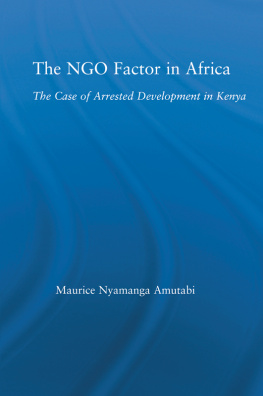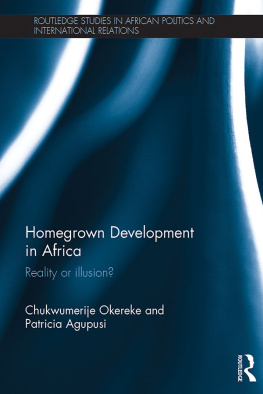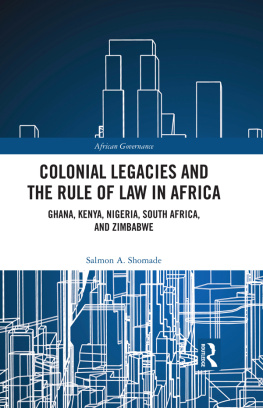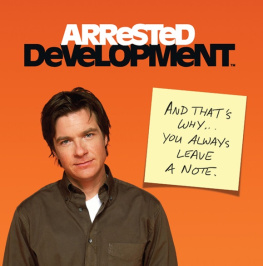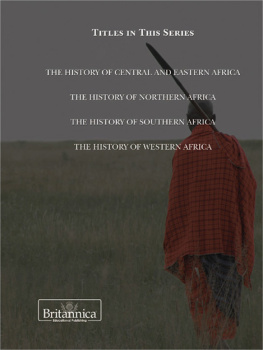AFRICAN STUDIES
HISTORY, POLITICS, ECONOMICS, AND CULTURE
Edited by
Molefi Asante
Temple University
A ROUTLEDGE SERIES
AFRICAN STUDIES
HISTORY, POLITICS, ECONOMICS, AND CULTURE
MOLEFI ASANTE, General Editor
THE CIVIL SOCIETY PROBLEMATIQUE
Deconstructing Civility and Southern Nigerias Ethnic Radicalization
Adedayo Oluwakayode Adekson
MAAT, THE MORAL IDEAL IN ANCIENT EGYPT
A Study in Classical African Ethics
Maulana Karenga
IGBO WOMEN AND ECONOMIC TRANSFORMATION IN SOUTHEASTERN NIGERIA, 19001960
Gloria Chuku
KWAME NKRUMAHS POLITICO-CULTURAL THOUGHT AND POLICIES
An African-Centered Paradigm for the Second Phase of the African Revolution
Kwame Botwe-Asamoah
NON-TRADITIONAL OCCUPATIONS, EMPOWERMENT AND WOMEN
A Case of Togolese Women
Ayl La Adubra
CONTENDING POLITICAL PARADIGMS IN AFRICA
Rationality and the Politics of Democratization in Kenya and Zambia
Shadrack Wanjala Nasongo
LAW, MORALITY AND INTERNATIONAL ARMED INTERVENTION
The United Nations and ECOWAS in Liberia
Mourtada Dme
THE HIDDEN DEBATE
The Truth Revealed about the Battle over Affirmative Action in South Africa and the United States
Akil Kokayi Khalfani
BRITAIN, LEFTIST NATIONALISTS AND THE TRANSFER OF POWER IN NIGERIA, 19451965
Hakeem Ibikunle Tijani
WESTERN-EDUCATED ELITES IN KENYA, 19001963
The African American Factor
Jim C. Harper, II
AFRICA AND IMF CONDITIONALITY
The Unevenness of Compliance, 19832000
Kwame Akonor
AFRICAN CULTURAL VALUES
Igbo Political Leadership in Colonial Nigeria, 19001966
Raphael Chijioke Njoku
A ROADMAP FOR UNDERSTANDING AFRICAN POLITICS
Leadership and Political Integration in Nigeria
Victor Oguejiofor Okafor
DOING JUSTICE WITHOUT THE STATE
The Afikpo (Ehugbo) Nigeria Model
O. Oko Elechi
STUDENT POWER IN AFRICAS HIGHER EDUCATION
A Case of Makerere University
Frederick Kamuhanda Byaruhanga
THE NGO FACTOR IN AFRICA
The Case of Arrested Development in Kenya
Maurice Nyamanga Amutabi
THE NGO FACTOR IN AFRICA
The Case of Arrested Development in Kenya
Maurice Nyamanga Amutabi
Routledge
New York & London
Routledge
Taylor & Francis Group
270 Madison Avenue
New York, NY 10016
Routledge
Taylor & Francis Group
2 Park Square
Milton Park, Abingdon
Oxon OX14 4RN
2006 by Taylor & Francis Group, LLC
Routledge is an imprint of Taylor & Francis Group, an Informa business
International Standard Book Number-10: 0-415-97995-1 (Hardcover)
International Standard Book Number-13: 978-0-415-97995-5 (Hardcover)
No part of this book may be reprinted, reproduced, transmitted, or utilized in any form by any electronic, mechanical, or other means, now known or hereafter invented, including photocopying, microfilming, and recording, or in any information storage or retrieval system, without written permission from the publishers.
Trademark Notice: Product or corporate names may be trademarks or registered trademarks, and are used only for identification and explanation without intent to infringe.
Library of Congress Cataloging-in-Publication Data
Amutabi, M. N. (Maurice Nyamanga)
The NGO factor in Africa : the case of arrested development in Kenya / Maurice Nyamanga Amutabi.
p. cm. -- (African studies : history, politics, economics, and culture)
Includes bibliographical references and index.
Contents: The paradox of NGOs in Africas development : unraveling their inconsistency -- NGOs, capitalism and globalization -- The genesis of NGOs : the idea, the movement and implications for Kenya -- The colonial state and development in Kenya : background to the NGO work in the country -- The role of the Rockefeller Foundation (RF) in medical research and health in Kenya -- The role of the Rockefeller Foundation (RF) in agriculture and education in Kenya.
ISBN 0-415-97995-1 (alk. paper)
1. Non-governmental organizations--Kenya. 2. Economic development projects--Kenya. I. Title. II. Series: African studies (Routledge (Firm))
HC865.Z9E4424 2006
338.91096762--dc22 | 2006012662 |
Visit the Taylor & Francis Web site at
http://www.taylorandfrancis.com
and the Routledge Web site at
http://www.routledge-ny.com
To the memory of my beloved sister, the late Rinah Anono, who died so early with all her great dreams; and to my grandmother, the late Beatrice Musimbi, the pioneer historian of the family.
.
Courtesy of the University of Texas Libraries, The University of Texas at Austin.
Since the 1980s, there has been an explosion of NGOs across Africa. To their champions, NGOs represent the pluralization of associational life, signifying Africas vigorous and reawakened civil society, part of the democratic wave that has rocked dictatorships across the continent and spawned more democratic forms of governance. In economic terms, NGOs are seen as popular instruments for more accountable and transparent participatory development in place of the outmoded and discredited statist models of the past. In reality, many African NGOs tend to be small in size, limited in budget, cluster in urban areas, concentrate on a narrow range of issues, and are weak in their internal capacities for research and analysis and in their national and regional networking relationships. Also, they are unmistakably dependent on Northern resources and support. Indeed, they are often replicas of their northern counterparts in their organization, objectives, tactics and strategies. It is increasingly clear from the growing literature on NGOs that the relationship between the international and indigenous NGOs has been characterized mostly by paternalism and dependency which limits the capacity of the African NGOs to undertake independent initiatives, address the economic, political, social, and cultural needs of their societies in an integrated manner, develop more fruitful South-South cooperation and networking, and cultivate local sources and structures of support, without which their long term future is uncertain.
Amutabi adds an important new voice in this expanding and critical literature on NGOs. He offers us an unusually powerful and passionate critique of the role of NGOs in contemporary Africa that will be provocative to many in the development and democratization industries and reassuring to those wary of the ever-mutating faces of western imperialism. He questions the laudatory views of NGOs, arguing forcefully that NGOs are not neutral or innocent bystanders in the great develop-mentalist drama unfolding in Africa but integral to the neo-colonial and neo-liberal projects of western imperialism that have done so much to disempower populations and distort development across the continent and in the global South more generally. It is a thesis stated with all the analytical and rhetorical vigor Amutabi can muster, dissecting equally the negative representations of Africa in NGO discourses and the negative consequences on Africa of NGO interventions.


